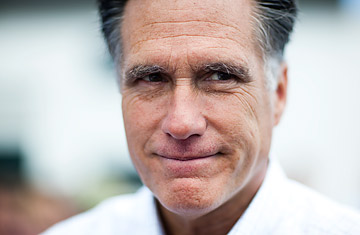
With Iowa's caucuses looming, Romney remains a second choice among many GOP faithful.
(4 of 7)
The impression that Romney is either furtive or phony in the service of this ambition has been exacerbated by the campaign he has chosen to run in 2011. It is the least accessible presidential campaign in memory. Chris Wallace of Fox News recently complained that Romney had not appeared on any of the Sunday-morning talk shows in nearly 20 months. He has allowed himself to be questioned by the reliable Sean Hannity, but he has not agreed to cooperate with any potentially tough, or even balanced, mainstream-media stories about him, including this one. This evasiveness might have become more of an issue if it weren't for two things: the near weekly schedule of debates has given Romney the appearance of accessibility, and the slapstick haplessness of his opponents has proved to be a riveting diversion.
The sideshow has worked to Romney's tremendous advantage. That he's an excellent debater hasn't hurt either. It has made him seem constant and competent by comparison, the most presidential of the bunch. But the question always remains: Who is he really? Do we have any clues as to what he actually believes?
Sifting through the Romney policy record, in an attempt to find patterns and answers, is an act of geology. There are sedimentary layers on issues like abortion, climate change, health care, gun control--almost any issue you can imagine. His shifts are usually artful and nuanced, although sometimes they can be brutally abrupt and painfully expedient, as with immigration, or assault-weapons bans, which he supported until his 2008 presidential campaign. It is often fascinating to watch Romney's mind at work as he flips his flops. Abortion is a classic case. His first public position was itself a flip-flop: running for the Senate in 1994, he announced that he was personally opposed to abortion but that "I do not impose my beliefs on other people." Previously, as a Mormon bishop, he had gone so far as to visit a woman in the hospital to try to dissuade her from having an abortion, a story recently recounted in both the New York Times and the Washington Post.
He was still sort of pro-choice when he ran for governor in 2002, but he started flopping his flip midterm as the dire Potomac virus set in; you can't be pro-choice in today's Republican Party. Romney later claimed that he saw the light on Nov. 9, 2004, when he had a long conversation with a stem-cell researcher. This is not entirely implausible: advances in biology, and especially sonogram technology--making it possible to see inside the womb--have caused a fair number of Americans to modify their positions on abortion over the past decade. I suspect that Romney's reversion to his original Mormon rectitude, on this and other social issues, may not have been purely a matter of political expediency. It may also have been something of a relief, after his clumsy attempts to please his more liberal constituents in Massachusetts. After all, he had chosen to become part of the Mormon-church hierarchy. (Huntsman, by contrast, didn't.) He must have felt comfortable with its conservative tenets--even if, according to recent accounts, he slowly came to terms with the concept of feminism ... although his present roster of advisers is top-heavy with men.
A Moderate Record
